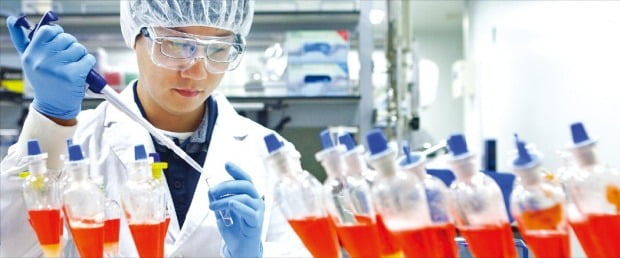IPOs
Korea’s tough IPO review drives bio startup to Nasdaq
S.Korea's pH Pharma is now looking to merge its subsidiary with a SPAC for Nasdaq listing after withdrawing its local IPO plan
By Apr 22, 2022 (Gmt+09:00)
4
Min read
Most Read
LG Chem to sell water filter business to Glenwood PE for $692 million


Kyobo Life poised to buy Japan’s SBI Group-owned savings bank


KT&G eyes overseas M&A after rejecting activist fund's offer


StockX in merger talks with Naver’s online reseller Kream


Mirae Asset to be named Korea Post’s core real estate fund operator



A South Korean bio startup is aiming for a Nasdaq listing, deeming that the country’s exchange sets the bar too high for an initial public offering of a venture in the sector.
South Korea’s pH Pharma is now seeking a backdoor listing on the Nasdaq through a merger with a special purpose acquisition company (SPAC) listed on the US tech-heavy stock exchange, according to the domestic bio-industry sources on Thursday.
The biopharmaceutical company is considering measures for the listing such as a merger of Peak Bio, its subsidiary established in March, with a SPAC. In such a merger, pH Pharma would transfer some of its new drug candidates to the unit.
Other South Korean bio startups are expected to follow the suit, industry sources said.
“Requirements for listings are so strict that bio companies have difficulties in fundraising. That could accelerate their moves to list on foreign stock markets,” said one of the sources.
Last year, only nine bio startups went public through eased rules for companies with prominent technologies, about half of 17 firms that were listed in 2020 via the special favor.
pH Pharma had tried to list on the country’s junior Kosdaq in early 2020, but it dropped the plan due to the Korea Exchange’s (KRX) tough requirements. It ran out of money for clinical trials in the meantime, with its cash holding at a mere 2.1 billion won ($1.7 million) as of the end-2021.
The startup, founded in 2015, adopted the "no research, development only (NRDO)" model, a strategy to buy promising new drug candidates from others and resell them or obtain approvals after clinical tests, rather than developing its own. The Kosdaq-listed Bridge Biotherapeutics Inc. has a similar business model.
FORCED TO GO GLOBAL
A Nasdaq listing is a great opportunity for a startup to raise money from global investors that recognize its technology. But pH Pharma is seeking the move since it faced difficulties in securing funds in South Korea amid the sluggish local IPO market and stringent requirements for a listing in the country.
The startup has been in the spotlight for its NRDO business among investors. It successfully raised 90 billion won from investors in 2019.
However, it has been in trouble since early 2020 when it failed to list on the Kosdaq. The KRX took issue with its other businesses such as cosmetics to make money for clinical trials during a review for the IPO, causing the company to cancel the listing plan in June 2020.
“The KRX may have lacked an understanding of its business model of importing candidates from others and reselling them after clinical tests,” said an industry source.
The NRDO is an emerging business model in the industry. The corporate value of Roivant Sciences, the world’s top NRDO company, was estimated at some $7.3 billion.
pH Pharma virtually suspended clinical tests of new drugs after it failed to go public. It secured approval for phase 3 clinical trials in South Korea of a glaucoma treatment in May 2021, but it has not even started the tests after nearly the year. In the UK and Ireland, the startup obtained approval for phase 2 clinical tests on a medicine for a rare genetic respiratory disease, but it could not progress due to funding issues.
The company had planned to resume the listing process last year but gave up as the KRX required the results of clinical tests that prove both the safety and efficacy of new drugs.
“It means they will approve (a listing) only when a company is at least conducting phase 2 clinical trials,” said an industry source. “They also mean that no biotech company will be allowed to conduct large-scale clinical tests with funds raised from an IPO.”
But the KRX said the exchange should protect investors.
“A listing of a bio venture with opaque financial conditions that is working on clinical tests in their early stages with uncertainty on their success will pose a risk to individual investors,” said a KRX source.
FEW ISSUES WITH NASDAQ LISTINGS
Other South Korean bio startups faced similar issues. Aprilbio Co., which signed a 540 billion won deal to export autoimmune disease treatment technology to Danish drugmaker Lundbeck, failed to pass a KRX listing review.
The exchange reportedly disapproved a listing of D&D Pharmatech, requiring the results of clinical tests to prove the efficacy of new drugs. Future Medicine Co., Enzynomics Co. and Y-Biologics withdrew their applications for preliminary reviews of their IPOs.

Those bio startups may seek IPOs on the Nasdaq as the South Korean bio sector has been expanding its presence around the world by exporting technologies worth billions of dollars, industry sources said.
“They will face few issues for a Nasdaq-listing as long as they meet basic requirements,” said a source at a local venture capitalist.
Write to Jae-Young Han at jyhan@hankyung.com
Jongwoo Cheon edited this article.
More to Read
Comment 0
LOG IN





